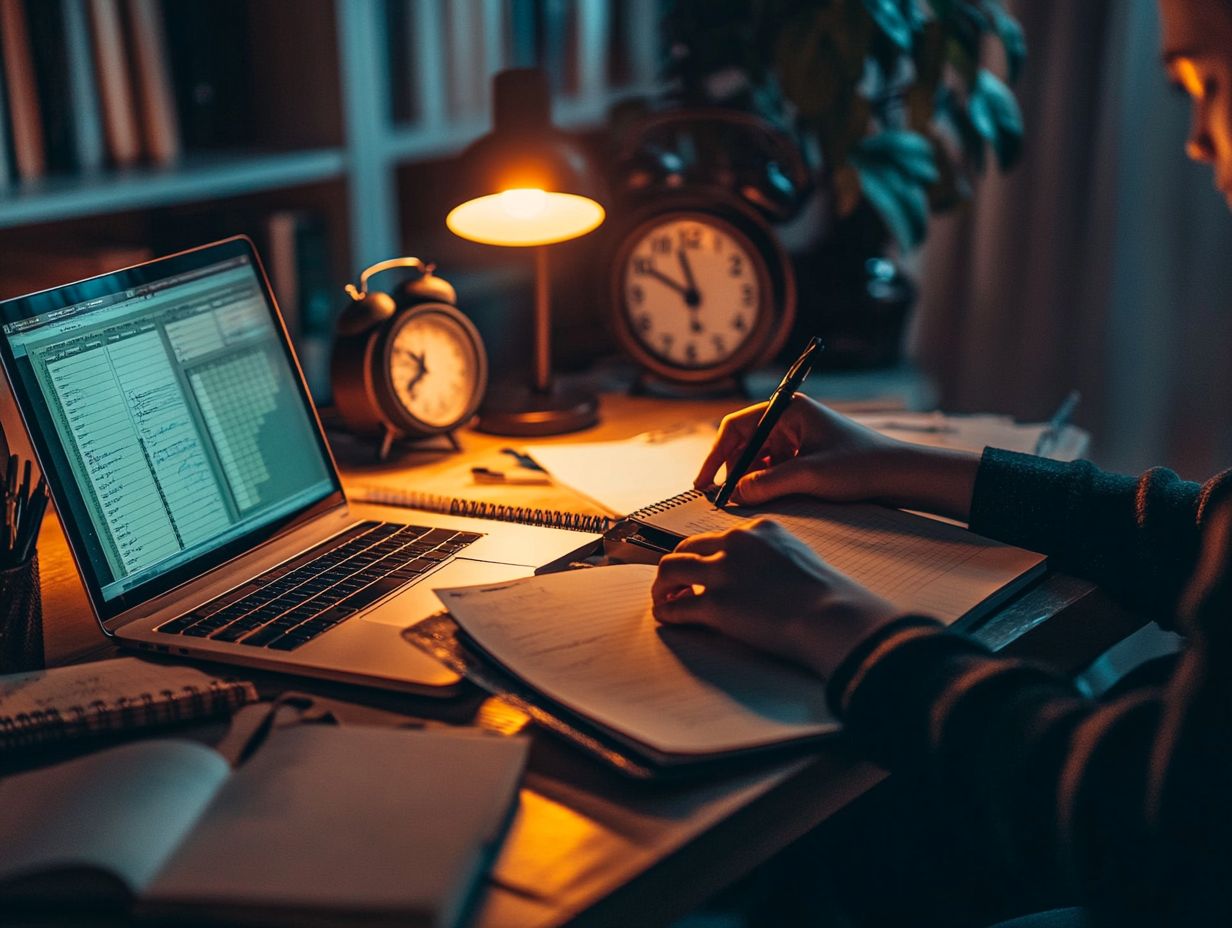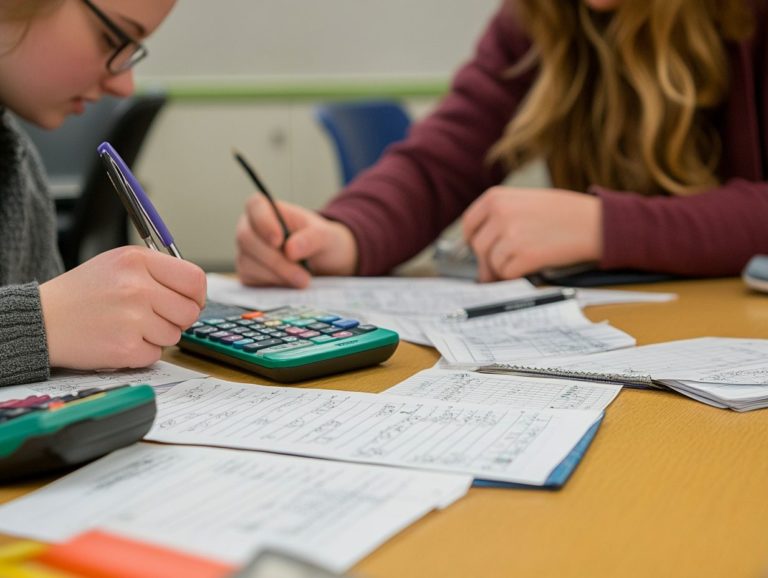how to maximize efficiency in study sessions?
Maximizing efficiency in your study sessions is essential for achieving academic success and fostering personal growth.
This article delves into key strategies that can elevate your study habits, beginning with a clear definition of efficiency and its importance in your learning journey.
Discover how to craft the perfect study environment, master time management techniques, and implement active learning methods that significantly enhance retention.
We will explore the crucial role of breaks and self-care in maintaining your focus. By the end, you ll possess a toolkit of effective techniques designed to transform your study sessions into productive and fulfilling experiences.
Contents
- Key Takeaways: Maximize your study efficiency!
- Understanding Efficiency in Study Sessions
- Creating an Effective Study Environment
- Effective Time Management Techniques
- Utilizing Active Learning Methods
- Incorporating Breaks and Self-Care
- The Importance of Rest and Self-Care in Studying
- Maximizing Efficiency Through Study Techniques
- Effective Note-Taking and Information Processing Strategies
- Staying Motivated and Focused
- Tips for Maintaining Motivation and Focus During Study Sessions
- Frequently Asked Questions
Key Takeaways: Maximize your study efficiency!

Create an organized, distraction-free study space.
Master your time management and prioritize effectively.
Take breaks and practice self-care to stay focused and motivated.
Understanding Efficiency in Study Sessions
Understanding efficiency in your study sessions is essential for enhancing your academic success. Implementing best practices for group study not only maximizes your productivity but also promotes better retention of course materials.
By incorporating self-reflection techniques and self-regulated learning practices, you can identify your strengths and weaknesses, allowing you to tailor your study plans accordingly.
The pursuit of efficiency directly influences your learning outcomes, giving you the power to achieve your academic goals while managing your time effectively and minimizing distractions.
Defining Efficiency and Its Importance in Studying
Efficiency in studying is all about maximizing your learning outcomes while minimizing the time and resources you expend during study sessions. To enhance this process, it’s important to know how to stay engaged during long study sessions. This concept depends on your commitment and has a significant impact on your overall academic performance.
By honing effective study practices, you can simplify how you study, allowing you to absorb material more rapidly while keeping procrastination at bay. When you manage your time wisely with structured schedules and prioritized tasks, it becomes much easier to balance various subjects and assignments.
Ultimately, embracing efficiency transforms your study habits, enabling you to engage with content in a meaningful way while accomplishing more in less time. This creates a rewarding cycle of academic success that you’ll love!
Creating an Effective Study Environment
Are you ready to boost your study game? Establishing an effective study environment is crucial for cultivating concentration and enhancing your overall productivity during study sessions.
Your ideal study space should be organized and equipped with all the tools you need to facilitate focused studying.
Elements like background noise, lighting, and the arrangement of your materials greatly affect your ability to engage with the course content. By minimizing distractions and maximizing organization, you can elevate your study habits and achieve more gratifying learning outcomes.
Optimizing Study Space and Minimizing Distractions
To truly optimize your study space and minimize distractions, it’s essential to carve out a dedicated area that fosters focus and active engagement with your study materials.
Start by choosing a quiet room or corner, free from interruptions, to facilitate deeper concentration. Implementing organization techniques like decluttering your desk and keeping only the essentials will help you stay on task.
Consider utilizing tools such as noise-cancelling headphones to block out ambient sounds, creating a serene environment that enhances your focus.
Incorporating strategies like the Pomodoro Technique can further elevate your study sessions by allowing for efficient time management through structured breaks. To enhance your study effectiveness, consider these tips for organizing a study group effectively. This approach not only supports sustained attention but also boosts your overall productivity.
Effective Time Management Techniques

Effective time management techniques are essential for students who strive to balance their academic workload and achieve study goals.
By prioritizing tasks and crafting a structured study plan, you can allocate your time efficiently. This ensures you cover all necessary course materials.
Setting clear goals helps you focus during study sessions and significantly enhances your academic performance.
You can use time management strategies like the Pomodoro Technique or time blocking to boost productivity and minimize procrastination. This makes your study time more rewarding.
Strategies for Prioritizing Tasks and Managing Time
Prioritizing tasks effectively is crucial for robust time management. It allows you to channel your efforts into impactful study techniques.
By implementing frameworks like the Eisenhower Matrix, you can categorize tasks based on urgency and importance. This tool helps you decide what tasks are most important and which can wait.
The ABC method lets you label tasks as A (most important), B (important but less so), or C (least important). This creates a clear roadmap for your study sessions.
These strategies can enhance productivity, facilitate a structured approach to learning, and minimize overwhelm.
Utilizing Active Learning Methods
Active learning methods are vital for deepening your understanding and retention of course materials.
Engaging with the material through self-testing, concept maps, and memorization strategies fosters active involvement. This solidifies your learning.
By incorporating diverse learning strategies, you can enhance your study skills and elevate your overall academic performance.
Active participation in the learning process is fundamental to effective studying.
Engaging with Material for Better Retention
Engaging with study material meaningfully can enhance retention and understanding. This allows you to recall information effortlessly during exams.
Techniques like summarization condensing information into your own words reinforce comprehension and create a personal connection to the content.
Participating in discussions encourages you and your peers to explore diverse perspectives and clarify complex concepts.
Applying what you ve learned through practical exercises solidifies your grasp of the material and bridges the gap between theory and practice.
These cognitive strategies promote deeper learning and lead to improved academic performance and long-term memory retention.
Incorporating Breaks and Self-Care
Incorporating breaks and self-care into study sessions is essential for maintaining productivity and achieving long-term academic success.
Regular breaks refresh your mind, reduce mental fatigue, and sharpen focus during crucial study periods.
Dive into mindfulness practices, physical activity, and proper nutrition to positively impact your learning outcomes.
By balancing intense study with adequate rest, you can enhance cognitive function and improve information retention.
Why wait? Start managing your time effectively today and watch your academic performance soar!
The Importance of Rest and Self-Care in Studying

Rest and self-care are essential for an effective study routine. They enhance productivity and how your brain works.
Without adequate rest, your brain struggles to consolidate information and maintain focus. This makes it hard to retain what you’ve learned. Incorporating self-care practices like mindfulness, regular exercise, and nutritious eating can significantly boost your memory retention.
These habits rejuvenate your mind and create a positive atmosphere for academic success. When you prioritize your well-being, you ll likely notice heightened concentration and clarity.
Remember, a well-rested mind is your secret weapon for tackling complex tasks and absorbing new material with ease.
Maximizing Efficiency Through Study Techniques
Maximizing your efficiency through effective study techniques is essential for optimizing your learning experiences and outcomes, including knowing how to stay motivated during study sessions.
By adopting proper note-taking strategies and structured information processing, you can absorb knowledge more effectively.
Techniques like the Cornell Note-Taking System or mind mapping can revolutionize how you organize and recall information. They transform your study sessions into truly productive endeavors.
Incorporating a diverse array of study techniques will significantly enhance your overall academic performance.
Effective Note-Taking and Information Processing Strategies
Effective note-taking and information processing strategies are vital for improving memory retention and understanding study materials.
By using techniques such as the Cornell method, mind mapping, and digital tools, you can customize your approach to fit your learning style.
These methods encourage active engagement with content and enable better organization of your thoughts.
If you’re a visual learner, diagrams and charts may help you consolidate information, while auditory learners might benefit from summarizing their notes aloud.
Integrating these diverse strategies fosters deeper comprehension, paving the way for long-term retention and academic success.
Staying Motivated and Focused
Staying motivated and focused is crucial for students aiming to excel academically, especially during intense study sessions.
To maintain motivation, consider setting achievable goals and cultivating a supportive learning environment. Use effective strategies to minimize distractions.
When you establish a clear purpose for your study sessions, you engage deeply with your course materials and sustain your concentration.
This clarity enhances your academic success.
Tips for Maintaining Motivation and Focus During Study Sessions
- Establish a structured study routine that aligns with your peak performance times.
- Incorporate short breaks into your study schedule to rejuvenate your mind.
- Use the Pomodoro method: work for 25 minutes, then take a 5-minute break.
- Create a dedicated study space free from clutter to reduce distractions.
- Use tools like to-do lists or digital planners to track tasks and deadlines.
Frequently Asked Questions

What are some tips for maximizing efficiency in study sessions?
Some tips for maximizing efficiency in study sessions include:
- Creating a study schedule
- Eliminating distractions
- Taking breaks
- Utilizing study techniques like active recall and spaced repetition
- Setting specific goals for each session
Start implementing these strategies today and watch your study performance soar!
How can I avoid burnout during study sessions?
To avoid burnout, take regular breaks and prioritize self-care. Simple steps like taking short walks, staying hydrated, and getting enough rest can make a big difference.
Switching up your study methods keeps things fresh and engaging. Try different techniques to find what works best for you!
Struggling to focus during study sessions?
Change your environment, turn off your phone, or listen to instrumental music. Breaking study sessions into smaller chunks and taking regular breaks can also help you concentrate better.
Is it better to study in short bursts?
Yes! Research shows that shorter study bursts with breaks are more effective than long sessions. This method improves information retention and helps prevent burnout.
How does organization affect study efficiency?
Staying organized is key. Keep your workspace tidy, have all materials ready, and break down your study material into smaller, manageable parts.
How important is a study plan?
A study plan is crucial for effective studying. It keeps you on track and helps ensure you cover everything without feeling overwhelmed.






